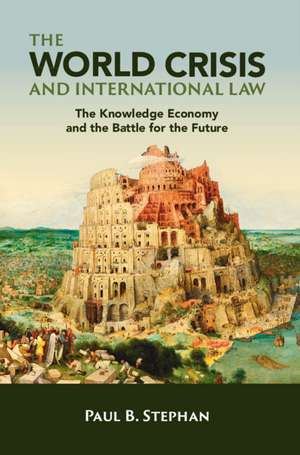The World Crisis and International Law: The Knowledge Economy and the Battle for the Future
Autor Paul B. Stephanen Limba Engleză Paperback – 8 feb 2023
| Toate formatele și edițiile | Preț | Express |
|---|---|---|
| Paperback (1) | 177.58 lei 6-8 săpt. | |
| Cambridge University Press – 8 feb 2023 | 177.58 lei 6-8 săpt. | |
| Hardback (1) | 528.80 lei 6-8 săpt. | |
| Cambridge University Press – 8 feb 2023 | 528.80 lei 6-8 săpt. |
Preț: 177.58 lei
Nou
Puncte Express: 266
Preț estimativ în valută:
33.98€ • 35.11$ • 28.28£
33.98€ • 35.11$ • 28.28£
Carte tipărită la comandă
Livrare economică 26 martie-09 aprilie
Preluare comenzi: 021 569.72.76
Specificații
ISBN-13: 9781009320993
ISBN-10: 1009320998
Pagini: 296
Dimensiuni: 154 x 229 x 18 mm
Greutate: 0.41 kg
Editura: Cambridge University Press
Colecția Cambridge University Press
Locul publicării:Cambridge, United Kingdom
ISBN-10: 1009320998
Pagini: 296
Dimensiuni: 154 x 229 x 18 mm
Greutate: 0.41 kg
Editura: Cambridge University Press
Colecția Cambridge University Press
Locul publicării:Cambridge, United Kingdom
Cuprins
1. The crisis arrives; Part I. The Rise and Fall of Liberal Internationalism and the New World Order: 2. The end of communism and the embrace of the Washington Consensus (1989–2000, Part I); 3. New international organizations and their ambitions (1989–2000, Part II); 4. Cracks in the foundation and system shocks: terror, the great recession, and the Arab Spring (2000–15); 5. Crises come in waves: national populism, the poisoning of cyberspace, a new cold war, and the pandemic (2015–21); Part II. The Knowledge Economy: World Conquest and Creative Destruction: 6. Knowledge, technological innovation, and wealth; 7. Law and the knowledge economy: what the winners want; 8. Losing and location in the knowledge economy: the view from the Hinterlands and the Chinese alternative: Part III. Battlegrounds: 9. International security, cyber disruption, and human rights; 10. Immigration; 11. Trade and investment; 12. The treason of the clerks: judicial revolts against international law; Part IV. International Law Futures: 13. Dancing along the precipice; 14. What may endure; 15. Conclusion.
Recenzii
'At a time when we try to understand the crises the world is facing, this book digs deep and solves a big part of a puzzle. Knowledge is generally seen as good, but the knowledge economy as the input to globalization may produce undesired consequences. The book does not throw out the baby with the bath water but attempts to save liberal internationalism from itself with concrete proposals for international law and governance. A must-read for anybody seeking solutions to our current crises.' Anne van Aaken, University of Hamburg
'A brilliant account of the economic, social, and political factors contributing to the unraveling of international law and institutions since the heyday of 'liberal internationalism.' Stephan persuasively shows how the accelerating pace of technological change induced by the knowledge economy explains this unraveling, and how nations can spark new forms of international cooperation to respond to global challenges. This book is a must-read for understanding where international law is today.' Jack Goldsmith, Harvard Law School
'We hear a lot today about threats to the liberal world order. In this timely book, a leading American scholar of international law offers an incisive and original account of that order-including how it developed, what sustained it, and why it is unraveling. Drawing together a wide range of examples, Stephan lays out what it will take to restore the international consensus needed to confront global challenges of the future.' Matthew Waxman , Columbia Law School
'A brilliant account of the economic, social, and political factors contributing to the unraveling of international law and institutions since the heyday of 'liberal internationalism.' Stephan persuasively shows how the accelerating pace of technological change induced by the knowledge economy explains this unraveling, and how nations can spark new forms of international cooperation to respond to global challenges. This book is a must-read for understanding where international law is today.' Jack Goldsmith, Harvard Law School
'We hear a lot today about threats to the liberal world order. In this timely book, a leading American scholar of international law offers an incisive and original account of that order-including how it developed, what sustained it, and why it is unraveling. Drawing together a wide range of examples, Stephan lays out what it will take to restore the international consensus needed to confront global challenges of the future.' Matthew Waxman , Columbia Law School
Notă biografică
Descriere
A hard look at the challenges to the authority and roles of international legal institutions since the 1990s.
